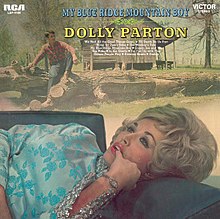
Trio is a collaborative album by American singers Dolly Parton, Linda Ronstadt, and Emmylou Harris. It was released on March 2, 1987, by Warner Bros. Records. The album has platinum certification in the U.S. for sales of one million copies, and has total worldwide sales of approximately four million. A second collaborative album, Trio II, was released in 1999.

Coat of Many Colors is the eighth solo studio album by American singer-songwriter Dolly Parton. It was released on October 4, 1971, by RCA Victor. The album was nominated for Album of the Year at the 1972 CMA Awards. It also appeared on Time magazine's list of the 100 Greatest Albums of All Time and at No. 257 on Rolling Stone's 2020 list of the 500 Greatest Albums of All Time. Parton has cited the title track on numerous occasions as her personal favorite of all the songs she has written.

Heartbreaker is the twentieth solo studio album by American singer-songwriter Dolly Parton. It was released on July 17, 1978, by RCA Victor. The album was produced by Gary Klein and Parton with Charles Koppelman serving as executive producer, and was an even more direct aim at the pop charts, with several of its songs verging on disco. The album topped the Billboard Top Country Albums chart for nine consecutive weeks and peaked at number 27 on the Billboard 200. The album produced two number one hits on the Billboard Hot Country Songs chart, "Heartbreaker" and "I Really Got the Feeling", while "Baby I'm Burnin'" peaked at number 25 on the Billboard Hot 100. The album has been certified Gold in the United States and Canada.
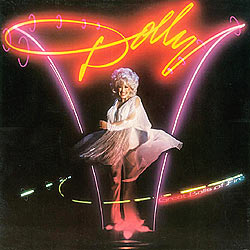
Great Balls of Fire is the twenty-first solo studio album by American singer-songwriter Dolly Parton. It was released on May 28, 1979, by RCA Victor. The album was produced by Dean Parks and Gregg Perry with Parton and Charles Koppelman serving as executive producers. The album peaked at number four on the Billboard Top Country Albums chart and number 40 on the Billboard 200. Two of the album's four singles charted in the top ten of the Billboard Hot Country Songs chart. "You're the Only One" topped the chart, while "Sweet Summer Lovin'" peaked at number seven. The album has been certified Gold in the United States.

Porter & Dolly is the thirteenth and final collaborative studio album by Porter Wagoner and Dolly Parton. It was released on August 4, 1980, by RCA Victor. The album is made up of previously unreleased material recorded during Wagoner and Parton's duet years (1967–76), with new studio overdubs. It was released as part of a settlement from legal action Wagoner took against Parton following her departure from his band and syndicated television series. Two singles were released from the album. "Making Plans" peaked at number two on the Billboard Hot Country Singles chart and "If You Go, I'll Follow You" peaked at number 12.

Once Upon a Christmas is a collaborative studio album by Kenny Rogers and Dolly Parton. It was released on October 29, 1984, by RCA Records. The album was produced by Rogers with David Foster. It was Rogers' second Christmas album, following 1981's Christmas, and Parton's first. The album's release was accompanied by a CBS television special, Kenny & Dolly: A Christmas to Remember. The album was certified 2× Platinum by the RIAA in 1989.

Bubbling Over is the twelfth solo studio album by American singer-songwriter Dolly Parton. It was released on September 10, 1973, by RCA Victor. The album cover photo was shot by Nashville photographer Les Leverett near the fountain at the Country Music Hall of Fame.

Rhinestone is the soundtrack album from the 1984 film of the same name starring Dolly Parton and Sylvester Stallone. It was released on June 18, 1984, by RCA Victor. The album was produced by Mike Post and Parton. It peaked at number 22 on the Billboard Top Country Albums chart and number 135 on the Billboard 200. The Dolly Parton-composed soundtrack produced two top ten singles on the Billboard Hot Country Songs chart: "Tennessee Homesick Blues" and "God Won't Get You", which peaked at numbers one and ten, respectively.

The Best of Dolly Parton is a compilation album by American singer-songwriter Dolly Parton. It was released on November 9, 1970, by RCA Victor. The album was produced by Bob Ferguson. It includes some of Parton's early hits, a few non-single album tracks, and two previously unreleased tracks. The album peaked at number 12 on the Billboard Top Country Albums chart. The single, "Mule Skinner Blues " peaked at number three on the Billboard Hot Country Songs chart and earned Parton a nomination for Best Female Country Vocal Performance at the 13th Annual Grammy Awards. The album was certified Gold by the RIAA on June 12, 1978, for sales of 500,000 copies.
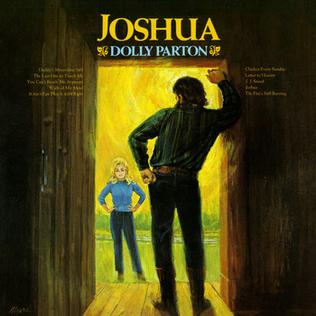
Joshua is the seventh solo studio album by American singer-songwriter Dolly Parton. It was released on April 12, 1971, by RCA Victor. The album was produced by Bob Ferguson. It peaked at number 16 on the Billboard Top Country Albums chart and number 198 on the Billboard 200 chart. The album's single, "Joshua", was nominated for a Grammy and was Parton's first song to reach number one on the Billboard Hot Country Songs chart.
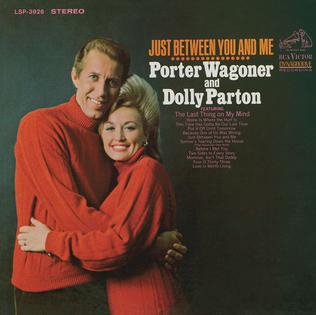
Just Between You and Me is the first collaborative studio album by Porter Wagoner and Dolly Parton. It was released on January 15, 1968, by RCA Victor. The album was produced by Bob Ferguson. It peaked at number eight on the Billboard Top Country Albums chart and spawned one single, "The Last Thing on My Mind", which peaked at number seven on the Billboard Hot Country Songs chart.

Just the Two of Us is the second collaborative studio album by Porter Wagoner and Dolly Parton. It was released on September 9, 1968, by RCA Victor. The album was produced by Bob Ferguson. It peaked at number five on the Billboard Top Country Albums chart and number 184 on the Billboard 200 chart. The album spawned three singles. "Holding on to Nothin'" and "We'll Get Ahead Someday" were top ten hits on the Billboard Hot Country Songs chart, peaking at numbers seven and five, respectively. The third single, "Jeannie's Afraid of the Dark", peaked at number 51.

Just Because I'm a Woman is the second solo studio album by American singer-songwriter Dolly Parton. It was released on April 15, 1968, by RCA Victor. The album was produced by Bob Ferguson. It peaked at number 22 on the Billboard Top Country Albums chart. The album's title track was the only single released and it peaked at number 17 on the Billboard Hot Country Singles chart.

In the Good Old Days (When Times Were Bad) is the third solo studio album by American singer-songwriter Dolly Parton. It was released on February 3, 1969, by RCA Victor. The album was produced by Bob Ferguson. It peaked at number 15 on the Billboard Top Country Albums chart. The album's title track was the only single released and it peaked at number 25 on the Billboard Hot Country Songs chart.
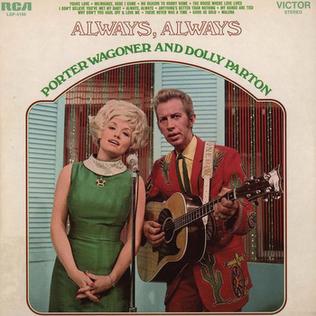
Always, Always is the third collaborative studio album by Porter Wagoner and Dolly Parton. It was released on June 30, 1969, by RCA Victor. The album was produced by Bob Ferguson. It peaked at number five on the Billboard Top Country Albums chart and number 162 on the Billboard 200 chart. "Yours Love" and the album's title track were released as singles, peaking at numbers nine and 16, respectively.

The Fairest of Them All is the fifth solo studio album by American singer-songwriter Dolly Parton. It was released on February 2, 1970, by RCA Victor. The album was produced by Bob Ferguson. It was the first of Parton's albums on which she wrote the majority of the songs. The Fairest of Them All peaked at number 13 on the Billboard Top Country Albums chart. The album's only single, "Daddy Come and Get Me", peaked at number 40 on the Billboard Hot Country Songs chart.

Porter Wayne and Dolly Rebecca is the fourth collaborative studio album by Porter Wagoner and Dolly Parton. It was released on March 9, 1970, by RCA Victor. The album was produced by Bob Ferguson. It peaked at number four on the Billboard Top Country Albums chart and number 137 on the Billboard 200 chart. Two top ten singles were released from the album, "Just Someone I Used to Know" and "Tomorrow Is Forever", peaking at numbers five and nine, respectively. "Just Someone I Used to Know" was nominated for Best Country Performance by a Duo or Group at the 12th Annual Grammy Awards.

Once More is the fifth collaborative studio album by Porter Wagoner and Dolly Parton. It was released on August 3, 1970, by RCA Victor. The album was produced by Bob Ferguson. It peaked at number 7 on the Billboard Top Country Albums chart and number 191 on the Billboard 200 chart. The album's single, "Daddy Was an Old Time Preacher Man", peaked at number 7 on the Billboard Hot Country Songs chart and was nominated for Best Country Performance by a Duo or Group at the 13th Annual Grammy Awards.

Hungry Again is the thirty-fifth solo studio album by American singer-songwriter Dolly Parton. It was released on August 25, 1998, by Decca Records and Blue Eye Records. The album was produced by Parton and her cousin, Richie Owens. It is seen as a predecessor to Parton's critically acclaimed bluegrass trilogy, The Grass Is Blue, Little Sparrow, and Halos & Horns.

The singles discography of American country singer-songwriter Dolly Parton includes over 200 singles and touches on eight decades. Parton has released 198 singles as a lead artist, 49 as a featured artist, six promotional single and 68 music videos. Parton also released 21 singles with Porter Wagoner from 1968 to 1980, bringing her total number of singles to 243.
